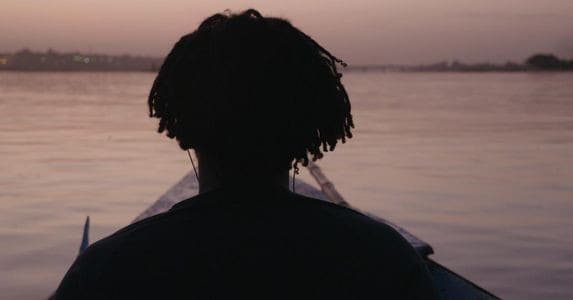African Apocalypse, 2020.
Co-written and directed by Rob Lemkin.
Starring Femi Nylander, Amina Weira, and Boubacar Assan Midal.

SYNOPSIS:
A young man’s epic journey across Africa in search of a colonial killer.

Rob Lemkin’s (Enemies of the People) new documentary confronts Europe’s grim imperial history with anger, accessibility, and a most unexpected through-line.
African Apocalypse opens with a quote from Joseph Conrad’s “Heart of Darkness,” – “The conquest of the Earth is not a pretty thing…when you look into it too much.” Lemkin’s film follows British-Nigerian activist Femi Nylander as he embarks on a quest to Niger, where he hopes to learn more about a real-life Colonel Kurtz-like figure – French Captain Paul Voulet, who was dispatched to Niger in 1899 to unite the French colonies in West Africa, spearheading a brutal massacre in the process.
Nylander notes early on that Voulet’s crimes are largely forgotten by Europeans – and certainly aren’t taught in schools – and so hopes to better educate himself, and by proxy us, by trekking through the man’s trail of destruction to his final resting place.
The end result is a haunting travelogue which covers many of Voulet’s horrifying sorties, while speaking to the ancestors of those he and his men slaughtered. If the opening sight of a still-levelled mosque is devastating enough, things get much worse; soon enough Nylander is guided past a mass grave, the bones within which are said to be visible when it rains.
Nylander’s journey is obviously an upsetting one, albeit nimble-minded enough in approach to avoid feeling like sheer misery-porn. In one aside, he speaks to locals who feel that Voulet’s presence created genuine spiritual disequilibrium in the region; a dubious claim, for sure, but an interesting diversion nonetheless.

Beyond visiting the sights of Voulet’s killings – including Birnin-Konni, where Voulet ordered a massacre of up to 15,000 people over six days – Nylander also learns of just how thoroughly the region continues to be exploited by France.
The uranium-rich country had to supply the material to the French tax-free until 2014, with a lack of safety precautions leading to many local miners dying or suffering brutal medical complications. As one subject points out, one-third of France’s lightbulbs are powered by this uranium, and yet, Niger itself is still extremely electricity-scarce.
At a wider level Lemkin’s film is a multi-faceted character study which not only attempts to get into the mind of its focal killer, but also digs deep into the psyche of Nylander himself. Nylander notes that he’s always felt like an outsider in England, being one of the few black faces attending Oxford University, and his complicated sense of identity is compounded when, in Niger, the locals tells him he may as well be white because he’s English.
One man laments his lack of emotional affect at hearing of Voulet’s atrocities, while another admonishes him for kneeling at Voulet’s grave respectfully when he finally makes it there. In a moment of disturbing turnaround, one of the women he speaks to then appears to offer him her daughter in exchange for a dowry, and tells him to “get lost” if he isn’t interested. Like us, Femi can’t quite tell if she’s joking or not.
This disparity between his comparatively privileged self and those he speaks to cause him to consider whether, as a “beneficiary of empire” as he puts it, he should feel any responsibility for what Voulet did more than 100 years prior.

The youngsters he speaks to certainly think modern Europe has a lot to answer for, with its mythic regard for Voulet seeming to suggest it holds the region in the same hateful stead. As Nylander himself notes, the nature of academic “reality” – which largely circumscribed Voulet’s greater atrocities – can’t measure up to the simple truth of meeting the descendants of those affected. And moreover, even if France did provide financial reparations, there’s of course no compensating the lives lost.
As bleak as this sounds, it’s not all depressing, and there are mild flecks of hope; Nylander takes us to a school where children are learning about solar panels and self-sustaining energy – a shrewd idea given that Niger is one of the sunniest countries on Earth.
We also witness a moving festival of remembrance at Birnin-Konni, which even includes beguiling recreations of the massacre, before Nylander himself joins in with the song and dance. Though as reminded by the sober epilogue – which was completed mid-pandemic – there’s still so much to be done, beginning with the ongoing fight to have colonialist icon Cecil Rhodes’ statue removed from Oxford University.
All in all, Nylander’s deeply personal investment in this story makes him a captivating guide, his velvet-voiced narration belying the horrors he and we are witnessing. In a sharp conceit, he frames much of his narration as an angry open letter of-sorts to Voulet, which when juxtaposed against well-deployed audiobook clips from Heart of Darkness, spoken dramatisations of historical reports, and even a period interview with a 97-year-old woman reflecting on her time held captive by Voulet, add up to a hugely compelling mix.
African Apocalypse wrestles with the savagery of western civilisation in uniquely disquieting fashion, while considering how the sins of the national past can be redressed today.
Flickering Myth Rating – Film: ★ ★ ★ ★ / Movie: ★ ★ ★
Shaun Munro – Follow me on Twitter for more film rambling.











